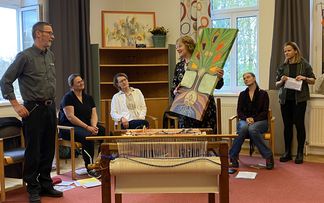Conviviality - the art and practice of living together
The concept of conviviality – the art and practice of living together when linked to vocation, dignity and justice forms a key to thought and practice in the area of economy and work.
‘The search for conviviality focuses on the good life of all as a concrete utopia and yardstick for political measures. Through the glasses of conviviality, people become visible as social beings whose greatest wealth is their relationship to each other. In our congregations, communities, and societies, to work on the quality of these social relationships is thus recognizable as a central task.’
Exchange, networking and learning from each other among socially committed and engaged Christians from different European countries is a core concern of the Cardijn Association. Our dear colleague on the Cardijn Association Board, Tony Addy, is in a special position for this.
In regular European seminars and training, we deal with questions such as: “How is good life for all possible?” And “What social role can churches and faith communities play in this?” Each time we take a European perspective. We work on these questions with regional and European partners on two levels: through the further development of a liberating and socially changing theology in Europe, as well as through training and exchange opportunities for people who are committed to improving working and living conditions.
The idea of conviviality, as the art and practice of successful life together, which Tony Addy develops in this text, with a view to the Christian churches engagement with work and economy, I see as an important current impulse for our work.
If we look at current social developments, as in our liberation-theological European seminars, we see increasingly how market-radical political thinking and action in many places in Europe puts pressure on the living conditions of broad sections of the population: through sharper divisions between rich and poor, cuts in social benefi ts, high (youth) unemployment and pressure on workers’ rights, just to name a few.
Throughout Europe those right-wing populist and extremist politicians benefit, who know how to exploit social tensions by focussing on the weakest, foreigners and those in need of protection.
The approach of “seeking conviviality” - as the art and practice of a successful living together - provides a stable starting point for a critique of these developments. Market-radical policies give precedence to the interests of the “big economy” and represent an extremely one-sided image of the human being: as separate, competing, personal advantage-seeking managers of themselves.
On the other hand, the search for conviviality focuses on the good life of all as a concrete utopia and yardstick for political measures. Through the glasses of conviviality, people become visible as social beings whose greatest wealth is their relationship to each other. In our congregations, communities, and societies, to work on the quality of these social relationships is thus recognizable as a central task.
In our cooperation as the Cardijn Association, with partners in living European networks, we experience a wealth of concrete diaconal and social initiatives, spaces for encounter, participatory social projects… dedicated to improving social relations and concrete local living conditions.
Conviviality as a core concept of diaconal work makes it possible to understand the individual activities as contributions to a more comprehensive search for conviviality. They are practical models of convivial coexistence in living worlds and are a contribution to working on the design of the concrete utopia of a convivial society and economy.
Beyond the questions of human coexistence, the concept of conviviality also focuses on the quality of our relationships with nature, that is, ecology. Thus, it offers a wealth of possibilities, both in the further formulation of a liberating theology as well as in concrete civic engagement to build bridges between the pressing social and the ecological issues of our time.
I am grateful for the intense debate that this text has inspired me and I hope that this impulse can reach many Christian and socially engaged people.
Rainer Rathmayr
president of the Cardijn association
Linz, Österreich
Dezember 2018

